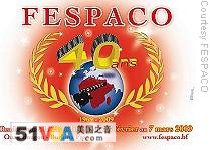Dakar
25 February 2009
 |
| FESPACO |
The festival began 40 years ago, when a group of Burkinabe journalists attended the first World Festival of Black Arts in Senegal's capital, Dakar. They were struck by the power of film as a means to convey post-independence Africa through African eyes and established the Pan-African Film and TV Festival of Ougadougou, also known as FESPACO.
Philippe Sawadogo, now Burkina Faso's minister of culture, was director of the festival for fifteen years.
"They thought about something interesting for Africa to continue to push our culture after the Dakar pan-African film festival," he said. "They started organizing a week of cinema. In '69, they started doing the first weekly film festival until the 1970s when we got institutionalization of FESPACO recognized by the government of Burkina."
Sawadogo says that at independence Africans did not see themselves on TV or in films.
"At that time we were just looking at Western movies, the American way of life. So they thought that it would be interesting to see our images ourselves. And they started promoting filmmakers in Africa. Quickly our filmmakers gave their addition to this movement and it became step by step a big festival," he explained.
FESPACO began with a handful of films from five West African nations. Today, there are 28 African countries represented and hundreds of films, including feature length fiction, shorts, documentaries and films from the African diaspora.
Issa Traore is a Burkinabe director and producer who won six prizes at FESPACO for a film about the experiences of Albinos in Africa.
Traore says the festival is very important because it has promoted generations of African filmmakers. FESPACO has been a springboard for Burkinabe filmmakers in particular, he says, because from very early on Burkina Faso has had the world of cinema right on its doorstep.
Traore says it is the only place in Africa that presents such a great selection of African productions.
For the 40th anniversary, the festival is promoting cinema from the African diaspora and is screening all past winners of the Stallion of Yennenga, awarded to the film that best shows Africa's realities.
This year's festival also celebrates the life and work of one of Africa's most talented artists, the Senegalese author and director, Ousmane Sembene, who died in 2007. The festival will screen a retrospective of Sembene's work and name a street in his honor.
Traore remembers Sembene as a great filmmaker.
Traore says the first time he ever saw Africans on the big screen was when he saw Sembene's 1968 film, Le Mandat. Sembene's films are social and political, he says. They provoke your conscience.
Widely considered the father of African cinema, Sembene's films gained international recognition and promoted African cinema worldwide. His last film, Mooladé, won awards at both the Cannes Film Festival and FESPACO.
But despite a hallowed history, the future of African cinema remains uncertain. Traore says the problem is that African film is not yet an industry.
Traore says most African films are largely reliant on European Union subsidies. With the global financial crisis, he says, African cinema is about to experience a very difficult period.
Traore believes that sub-Saharan African governments should invest in the production of African films, as have north African countries like Morocco and Tunisia who are now emerging as large film producers.
In FESPACO's 2009 competition, north African films outnumber their southern African neighbors. Of 16 feature-length films, nine are Moroccan. All of the short films entered are from the Maghreb countries.